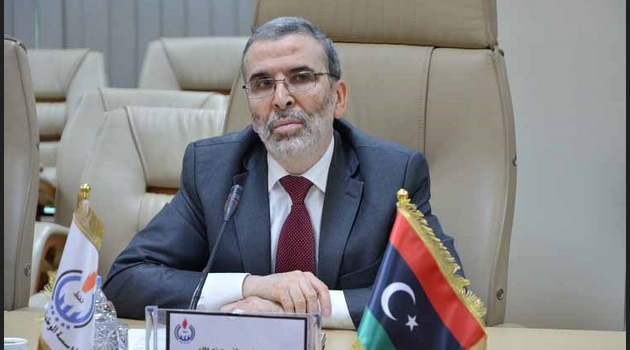By John Lee.
Libya's National Oil Corporation (NOC) has said there are no technical obstacles to meeting its short-term production targets of 1.1 to 1.2 million barrels per day (bpd), but adds that output is limited by a dispute with Germany's Wintershall.
In a statement, the NOC said:
"Libyan oil production exceeded 800,000 [bpd] for the first time since 2014, but a commercial dispute with one of its foreign partners related to Presidency Council Resolution 270 had shut in over 160,000 b/d of production, at a cost to the Libyan state of almost a quarter of a billion dollars per month".
NOC chairman Mustafa Sanalla (pictured) said:
“This is a very serious matter. We would be producing almost 1 million b/d if it were not for Wintershall’s refusal to implement terms it agreed to in 2010. Resolution 270 was written to allow Wintershall to evade its obligations. I have asked the Presidency Council to withdraw Resolution 270 for this reason and because it oversteps their authority. It has declined, and has instead sided with Wintershall against NOC.”
“With Resolution 270, the Presidency Council gave itself powers to negotiate investment agreements with foreign oil companies. This is beyond its legal authority and its competence. These powers are entrusted by law to NOC.
“Moreover, the Libyan people, out of whose pockets money is being taken, need to know that Resolution 270 was drafted with the assistance of Wintershall to benefit Wintershall."
NOC said Libyan oil production averaged 564,000 barrels per day in April, down from 641,000 bpd in March, 688,000 bpd in February, and 678,000 bpd in January.
“There are no technical reasons for the loss of production,” said Sanalla. “Apart from the Wintershall shut-in, we lost a significant amount of production in April from the Sharara and El-Feel fields, which were blockaded by units of the Petroleum Facilities Guards. We are able produce an average of 1.1 mln-1.2 mln b/d over the rest of this year, but for this to happen our oil must flow freely. A national effort is required."
The NOC statement continued:
The Presidency Council should withdraw Resolution 270. Tribal leaders should exclude blockaders from society. The Central Bank should issue regulations prohibiting payments to blockaders. And the Petroleum Facilities Guard must be part of the solution, not the problem, as they have indicated they wish to be. As with many problems in Libya, our oil production problems are solvable. What is required is that we work together as a nation.
Speaking last week in Houston at the Offshore Technology Conference, the largest event in the world for the oil and gas industry, Sanalla said Libya’s full potential remains largely unrealized. “We possess extensive acreage with discovered deposits in the Ghadames and Murzuq Basins which are not covered by agreements with oil companies and are still awaiting proper assessment,” he told delegates. “Our specialized teams are already reviewing the exploration and production sharing agreement terms, including contracting strategies to encourage investment in Libya by IOCs. We are preparing for our next bid rounds to be organized as soon as the country’s political stability permits.
” NOC’s delegation in Houston laid out three consecutive development phases to turn Libya into a Mediterranean oil production powerhouse.
The first phase would raise production to 1.32 million b/d by the end of 2017, at a cost of $550 million.
The second would raise production slowly to 1.5 mln b/d by the end of 2018, at a further cost of $1.8 billion, mainly directed at the Bahr Essalam offshore development with Italy’s Eni, but also envisioning a further approximately $1.2 billion investment in tank and pipeline replacement and maintenance; while a third phase would raise production gradually to 2.2 mln b/d by 2023, requiring investment of approximately $18 billion.
In an emailed reply to Libya Business News, a spokesperson for Wintershall said:
“As a result of not being included in the latest lifting programmes for Amna crude at Zueitina Terminal, Wintershall Libya was forced to shut in oil production from its onshore Concession 96 on 7 March 2017. It would not be an economic exploitation of the petroleum resources of the concession to continue production without generating revenues, but still being obliged to carry all production-related operational expenses.
“Wintershall has always met its obligations towards the Libyan state. More than that: we are engaged in the country for nearly 60 years and have since been maintaining a special and trustful bond with our Libyan partners – even throughout difficult times.”
(Source: NOC)





